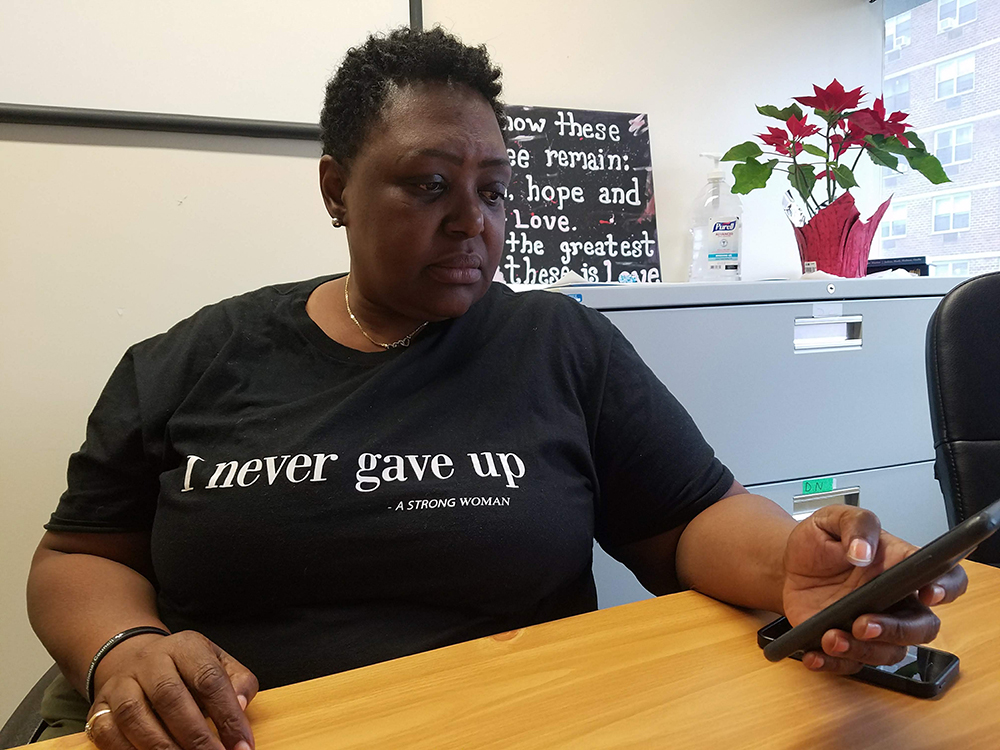
Jaya Sundaresh
Joyce McMillan is one of the advocates pushing for statewide reform of timely legal representation for parents.
NEW YORK — Angeline Montauban had no idea what was going on the day in 2013 that workers from the city Administration for Children’s Services knocked on her door to inquire about the well-being of her 3-year-old son.
She had recently called a domestic violence hotline; ACS was checking that the environment was fit for a child. She eventually filed for an order of protection against her husband, but ACS petitioned for a removal of her son on the basis that Montauban refused to file an order of protection on behalf of her child as well.
Montauban’s child’s father had never exhibited any violence toward her son, and, citing the large numbers of absentee fathers in the black community, she didn’t want to make her son a fatherless statistic.
 Nevertheless, the family court system successfully separated family and son for five years, eventually filing an order to terminate Montauban’s parental rights.
Nevertheless, the family court system successfully separated family and son for five years, eventually filing an order to terminate Montauban’s parental rights.
“I would have liked an attorney from day one, not just when I landed in court. It would have been a little better,” Montauban said.
Child welfare reform advocates agree, and are forming an alliance of activists and practitioners to advocate for more timely representation statewide for parents accused of abusing or neglecting their children.
The advocates, led by reformer Joyce McMillan, formerly of the Child Welfare Organizing Project, seek to enshrine the recommendations of the recent Commission on Parental Legal Representation into state law. The commission, created a year ago by Janet Difiore, the chief judge in New York state, called for a right to timely representation for parents under investigation by child protective services, and the establishment of a statewide office to support this goal.
The advocates have had a lobbying day in Albany and are currently drafting legislation.
Upstate counties oppose reforms
In some ways, this group of advocates, which includes The Bronx Defenders, Brooklyn Defender Services, the Drug Policy Alliance and the Center for Family Representation, is seeking to export to the rest of the state a system that includes access to wraparound social services for any parent being investigated by child protective services. New York City residents have had access to this system since 2007. However, limited city-sourced funding has made the mandate’s execution patchy and unreliable. A state source of funding would solidify this right in New York City and all over the state.
The reformers face potentially serious opposition from upstate counties, which are reluctant to change their child protective service practices to favor parents. The conflict illuminates a central tension between two competing visions of child protective services — one in which the interests of parent and child are competing and one in which, in order to support the child, their parent must be supported as well.

Michele Cortese, executive director of the Center for Family Representation, believes “parents are just not going to work as productively with someone who can take their children.”
Michele Cortese, executive director of the Center for Family Representation, also a member of the Commission for Parental Legal Representation, takes the latter view.
“It’s the rare situation where the need to protect a child means their interest is distinct from their parents,” she said. “This dialogue should be about families. Especially when we’re talking about poor people, we feel that supporting the sanctity of the family is worth going the distance.”
Angela Burton, a director at the New York State Office of Indigent Legal Services, said children are often taken from their homes unnecessarily, and that children’s services can put undue burdens on parents whose only crime, often, is poverty.
“Let’s look at a typical allegation in a child neglect petition: a dirty house,” she said. A better solution than taking a child out of an otherwise loving home would be to get a housecleaning service for the parents, she said: “This isn’t a reason to find a parent guilty of neglect. It’s not sufficient basis to take a child out of a home.”
The data corroborates the idea that families should be preserved, as much as possible. Research has demonstrated that time a child spends in foster care and away from their parent can hurt them psychologically for years afterwards. For the past few decades, federal policy has favored family unification as a goal of child protective services and has tailored its recommendations to this effect.
The federal Administration for Children and Families, in addition to urging state and local child protective services to favor family unification, released a memo in 2017 that argued that timely representation for parents accused of neglect or abuse is a good way for families to stay together.
Why county rejected grant
None of this was a convincing argument for leaders in Monroe County, where Rochester, N.Y., about 300 miles northwest of New York City, is located.
A little less than a year and a half ago, Monroe County was offered a $2.6 million grant from Indigent Legal Services to create a program that would have given parents facing investigation from child welfare services earlier legal representation than they originally would have received. The grant would have made it possible for parents to receive access to a lawyer from the moment child welfare services knocked on their door, in order to investigate a claim of abuse or neglect against them. It would have also given parents access to a social worker and a parent advocate who had been through the child protective services system, who could offer advice and commiseration.
Monroe County turned the grant down, over fears that giving parents increased rights in a child welfare case would negatively affect children who were being abused, and that it would insert lawyers into the process too early.
A child protective services worker in Schenectady, 165 miles north of New York City, agreed with Monroe County’s decision. That worker, who chose to remain anonymous so as to not threaten her employment, also doesn’t see the need to involve lawyers early on, saying it will “muddy things up.”

New York State Office of Indigent Legal Services
Angela Burton, a director at the New York State Office of Indigent Legal Services, said children are often taken from their homes unnecessarily.
Faced with Burton’s “dirty house” scenario presented earlier, this worker said her agency would “come in and offer services,” rather than take the child away first. Before resorting to drastic measures, they’d give them a chance to ameliorate the situation.
She argues that the relationship between a parent facing investigation and a child protective service worker isn’t inherently adversarial. “It’s not like we go in there all punitive. We give them a chance to turn it around,” she said.
Cortese said there’s an inherent “built-in design defect” in the child protective services system. The job of a child protective services worker is to “help a family,” she said. “But their job is also to remove children if they think they need to. And in my experience, parents are just not going to work as productively with someone who can take their children or has taken their children.
“Some people trust the police, and some people don’t. It depends a lot on the neighborhood you live in and the color of your skin,” she said, drawing an analogy to law enforcement.
‘Design defects’
Angeline Montauban, the parent whose child was taken away from her for five years, agrees.
“Once the child protective services worker entered my life, the minute she knocked on my door, she was building up a case against me,” Montauban said. “You can’t expect ACS to be in a position of investigating parents, prosecuting parents, and be in a position to inform parents of their rights.”
(Montauban, although she lived in New York City and had a technical right to early legal representation, did not have access to the kind of wraparound services that Center for Parental Legal Representation provides. This is because, absent state money, the city cannot afford to cover every parent under investigation. Reform advocates are hoping to change this.)
However, Cortese does agree with the Schenectady worker that the intentions of child protective services is to preserve the family unit wherever possible.
“I think some child protective services workers legitimately want to overcome the design defects that are built in, but you can’t, altogether,” she said.
Nearly a year later, Monroe County wouldn’t comment on their decision to turn down the grant.
However, Erie County, which contains New York State’s second-biggest city, Buffalo, 340 miles northwest of New York City, was willing to comment on the deal; saying that if the grant had been offered to them, they would have turned it down as well..
Peter Anderson, spokesperson for the county executive, wrote in an email that “the Department does not disagree that parents should receive access to a quality attorney as soon as possible following an investigation by Child Protective Services, but there is a concern that the majority of attorneys for the parents would advise their clients to not participate in CPS investigations, thereby negatively impacting CPS’ ability to keep children and families safe.”
The proposed program “actually seems more geared towards protecting parents than children,” he said.
When told of Erie County’s reaction to timely representation reforms, Cortese sounded exasperated. “I’m just telling you that my experience is the opposite,” she said.
“There’s a notion that if you give parents access to confidential attorney and social work support during an investigation, that somehow safety concerns are going to get buried or hidden. It’s just not true,” she said.
The team that the Center for Family Representation assembles to represent a parent being investigated is cooperative with child protective services, she argues. It’s just that their definition of what’s in the child’s best interest is different sometimes from the child welfare agency’s idea.
“We’re just not cooperating with formulaic, ill-conceived, cookie-cutter service plans that the child protective services might come up with,” Cortese said.
Racial disproportion
“Allowing people to have access to legal aid early on actually helps children if a case is eventually filed,” said Burton, of the Office of Indigent Legal Services. As the Commission on Parental Legal Representation pointed out, parents are more likely to cooperate with the child welfare process if they are given legal representation earlier.
New York City’s own child protective services agency completely disagrees with Erie and Monroe County’s assessment.
“We believe the multidisciplinary team approach with well-trained lawyers with manageable caseloads, and support from social workers and parent advocates not only can be exported, but should be exported,” a spokesperson for the administration said.
These days, Angeline Montauban has her son back. After five years of wrangling with the Administration for Children’s Services, then-Public Advocate Tish James filed a class-action lawsuit against the administration, alleging that New York City children were languishing in foster care for too long. Montauban said he is happy to be home but has been indelibly changed by his time in foster care.
She sees racism at the root of the child protective services system.
“They’re fine with breaking up black families. They’re really fine with that. We live in a society that’s completely fine with the separation of black and brown families,” she said, bitterly.
Black children are disproportionately represented in the foster care system and in the numbers of children adopted away from their birth families who have lost their parental rights nationally. In New York City, only 6% of children in foster care are white — the rest are largely black and/or Latino.
And in New York state, black children are more than twice as likely to be represented than white children in calls to the State Central Registry, which is where child welfare cases originate.
This story has been updated.































